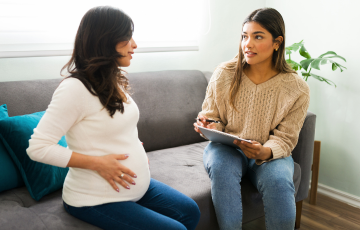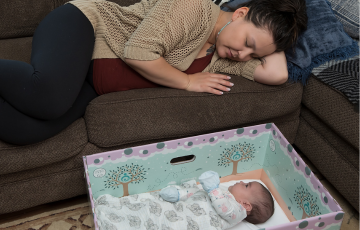Baby and You
Congratulations on your new baby! Whether you're feeling excited, tired, overwhelmed—or all of the above—you're not alone. This guide is here to support you with simple tips and helpful resources for caring for your baby and yourself.
Caring for Your Baby
Here are some of the most important things you can do to help your baby grow and stay healthy:
- Feed your baby: Breast milk or formula gives your baby the nutrition they need. If you’re breastfeeding, your nurse or midwife can help you get started. Learn more about infant feeding and nutrition.
- Rest and recover: After giving birth, your body needs time to heal. Try to rest as much as possible in the first few days, whether you're in the hospital or at home.
- Keep your baby safe: Use a car seat every time you travel, keep your home smoke-free, and follow safe sleep tips to help prevent Sudden Infant Death Syndrome (SIDS).
- Talk and cuddle: Holding and talking to your baby helps build a strong bond and supports their development.
- See your doctor or nurse regularly: Schedule checkups for your baby and yourself.
- Take care of yourself: Your health matters too. Ask for help when you need it.
First days with your baby
- Rest is key: Your body has been through a lot. Give yourself permission to rest and recover.
- Bonding takes time: Every parent connects with their baby in their own way. Spend quiet time holding and getting to know your baby.
- Limit visitors: It’s okay to ask friends and family to wait until you’re home and ready for company.
- Feelings are normal: You might feel joy, fear, exhaustion, or sadness. These emotions are common—be kind to yourself.
- Learning together: Nurses and midwives can show you how to feed, diaper, bathe, and safely sleep your baby.
- Going home: Most people go home within 2 days after a vaginal birth, or 3–4 days after a caesarean birth.
- Bleeding after birth: You’ll have vaginal bleeding for a few weeks. Ask your care team what’s normal.
- Ask for help: If someone can help with meals, laundry, or errands, you’ll have more time to rest and bond with your baby.
- Car seat safety: Make sure your baby’s car seat is certified, installed correctly, and less than 6 years old.
- Paperwork: You’ll get birth and name registration forms from your nurse or midwife.
- Home visits: A nurse may visit you at home within a week to check on you and your baby. A nurse will contact you and offer to visit you in your home within one week after the birth.
Your Mental Health Matters
- Feeling sad, anxious, or overwhelmed after birth is common. About 80% of new moms experience the “baby blues.”
- If these feelings last more than a week or feel intense, talk to your doctor, midwife, or public health nurse. You may be experiencing postpartum depression or anxiety.
- If you ever feel like you might hurt yourself or your baby, please reach out for help right away - contact your doctor, midwife, public health nurse, or a crisis line. You are not alone, and support is available.
Vaccines protect your baby
Vaccines help prevent serious illnesses. Talk to your doctor or nurse about how and when your child can be immunized.
Keeping your baby safe
Here are some simple ways to protect your baby from harm:
- Use a certified car seat every time you travel by car.
- Follow safe sleep guidelines to lower the risk of Sudden Infant Death Syndrome (SIDS).
- Baby-proof your home before your baby starts moving around.
- Keep your home smoke-free.
Car Seat Safety
Car seats save lives. In British Columbia, it’s the law to use one for every child in a vehicle.
- Buy a certified car seat before your baby is born.
- Always install the seat facing the back of the car.
- Never place a car seat in front of an airbag.
- The safest spot is the middle of the back seat.
- Avoid second-hand seats or any made before 1997, as these may not conform to current safety standards.
- Buckle your baby in properly every single time.
Did you know?
Safe Sleep Tips
Each week, three babies in Canada die from SIDS (Sudden Infant Death Syndrome). While the exact cause isn’t known, these steps can help reduce the risk:
- Use a firm mattress with no soft bedding or toys. Avoid soft mattresses, fluffy pillows, comforters, stuffed toys and bumper pads as they prevent proper air circulation around your baby's face.
- Always place your baby on their back to sleep.
- Avoid overheating—dress your baby warmly but not too hot - even during illness, babies should not overheat while sleeping.
- Breastfeeding may help lower the risk.
- Keep your home smoke-free.




